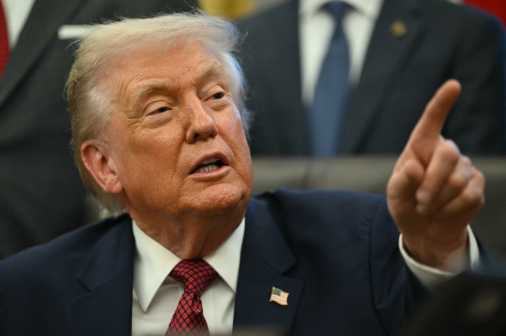Trump administration planning expansion of U.S. quantum strategy

The Trump administration is signaling to industry and allies that it is considering a broader set of actions related to quantum computing, both to improve the nation’s capacity to defend against future quantum-enabled hacks and ensure the United States promotes and maintains global dominance around a key national security technology.
The discussions include potentially taking significant executive action, such as one or more executive orders, a national plan similar to the AI Action Plan issued earlier this year, and a possible mandate for federal agencies to move up their timelines for migrating to post-quantum protections, multiple sources told CyberScoop.
None of the sources CyberScoop spoke with could provide a definitive timeline for an official rollout, but multiple executives in the quantum computing industry and former national security officials said the White House has signaled serious interest in taking bolder action to promote and shape the development of the technology. Some felt official announcements could come as soon as this week, while others cautioned the process could stretch into the coming months.
While quantum computers capable of breaking through classical encryption currently remain a theoretical threat, both government and industry have spent years planning for the day when the threats become real.
A major element of that plan has been slowly switching out older encryption algorithms in IT infrastructure for newer “post quantum” algorithms over the span of more than a decade.
One quantum executive, citing direct conversations with the government, said “everyone in the quantum industry from a policy standpoint” has been told some variation of the message “that the White House wants to do for quantum what they did for AI in July.”
A key component of one or perhaps multiple executive orders is language that would accelerate the deadline for federal agencies’ post-quantum migrations from 2035 to 2030.
The executive, speaking on condition of anonymity to avoid jeopardizing their relationship with the government, said the effort is being led by the White House’s Office of Science and Technology Policy (OSTP) and the Department of Commerce.
Commerce Deputy Secretary Paul Dabbar, a former Department of Energy official during President Donald Trump’s first term who co-founded and led his own quantum networking technology company during the Biden years, is “driving a lot of this,” the source said.
It’s not just industry that has received the message. A former official at the Department of Homeland Security who works with the Trump administration confirmed they had also been advised of upcoming action, and that officials at OSTP and the Office of Management and Budget have been particularly aggressive about moving forward.
“I did hear there was some forthcoming guidance for agencies, given the push with AI, but more specifically the need for government departments to be much more aggressive about what they’re doing, since the codebreaking capability of quantum is pretty significant for federal agencies,” said the official, who requested anonymity to discuss sensitive conversations with the federal government.
Multiple other former government officials and administration allies told CyberScoop that they have heard that the administration was preparing to take some kind of action around quantum computing in the near future.
An OMB official declined a request for comment from CyberScoop this week on the administration’s plans. The Department of Commerce did not respond to a similar request.
But White House officials have already teased bold action on quantum is in the works. In July, after the administration released its AI Action Plan, OSTP Director Michael Kratsios told an audience at a conference that “the president wrote me a letter the first week or two that I was in office that essentially gave me a charge for what I was supposed to do for the next three years.”
“He named three technologies in that letter: It was AI, quantum, and nuclear,” Kratsios said. “We had our big nuclear day a month-and-a-half ago. We had AI yesterday, so you can only assume — stay tuned.”
Pranav Gokhale, chief technology officer at Infleqtion, another quantum computing company, told CyberScoop he has heard similar rumors about an impending executive order focused at least in part on speeding up post-quantum migration efforts by federal agencies.
Part of the urgency reflects a desire to be aggressive in the face of uncertainty: no one knows quite when we will develop quantum computers capable of breaking encryption. There’s a running joke among experts and observers that quantum codebreaking is perpetually “five to 10 years away” from becoming reality.
Most experts — including cryptologists at the National Institute of Standards and Technology and the National Security Agency, which set encryption standards for the federal government and intelligence community — believe it is only a matter of time before such a breakthrough occurs. If that happens sooner than anticipated, the U.S. could be left unprepared.
Some national security officials pointed out that if governments in China, Russia or another country were to make a significant breakthrough on quantum codebreaking, there would be a powerful incentive to keep it secret for as long as possible to maintain an intelligence advantage.
Gokhale also said from the conversations he’s had, some in government and industry are pushing to make the safe and secure transition of cryptocurrencies to newer quantum-resistant encryption a priority, an issue that could be addressed by an executive order.
Discussions around prioritizing the migration of cryptocurrencies were confirmed by the first quantum executive that spoke with CyberScoop, though they said it’s less clear whether those ideas will ultimately make it into any White House executive order or formal plan.
Bitcoin in particular may need a bespoke strategy to safely migrate, Gokhale said, citing a research study put out last year by the U.K.’s University of Kent that looked at the technical costs of upgrading Bitcoin assets to newer quantum-resistant encryption.
Given that cryptocurrencies are already lucrative targets for cybercriminals and foreign hackers from countries like North Korea, the industry is likely to be among the early targets of a quantum-enabled hack, and left more vulnerable by a slower rollout.
“The conclusion is that the Bitcoin upgrade to quantum-safe protocols needs to be started as soon as possible in order to guarantee its ongoing operations,” the Kent authors wrote.
Madison Alder contributed reporting to this story.






